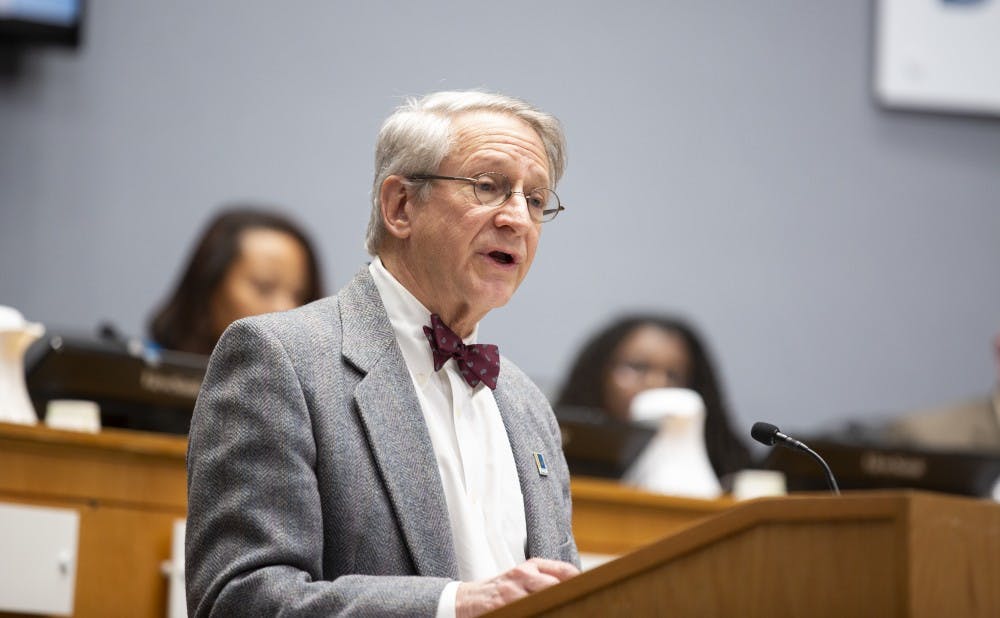Mayor Steve Schewel announced a stay-at-home order for Durham residents at a Wednesday press conference.
The stay-at-home order is set to run through April 30 and is intended to slow the spread of the COVID-19 pandemic. It bans individuals in Durham from traveling, going out in public or gathering in groups of more than 10 people, with some exceptions. It closes non-essential businesses, though their employees can still work from home. The order will go into effect Thursday, March 26 at 6 p.m. and last until April 30, Schewel said, though city officials will continually review it to see if it can end before that date.
“If we’re going to stop the spread of the virus, this is our window,” Schewel said. “We can’t wait until we are inundated with cases and our health-care system is stretched to the limit. Acting then is way too late.”
Law enforcement has the power to enforce the order, Schewel explained. He clarified that they don’t intend to cite or arrest anyone, instead breaking up public gatherings and “forcefully” telling people to comply.
Among the essential businesses that can remain open in Durham are those providing groceries, medicine and other essential household goods; human-services operations; health-care and public-health services; media organizations; gas stations and essential government services.
Restaurants can also remain open, though not for dine-in seating. Retail businesses can mail merchandise to customers—Schewel gave the example of the Regulator Bookstore on Ninth Street, which he said could mail out a book but could not allow someone to come to the store to pick it up.
Residents are allowed to leave their homes to perform tasks essential to health and safety, obtain necessary supplies and services, engage in some outdoor activities, perform “permitted business functions” or take care of others, according to the order.
“If there’s an egregious offense, I’m sure something else will have to happen, but I’m anticipating that there won’t be any egregious offenses,” he said. “I think that people are going to work together to make this work.”
Schewel noted that he expects the Durham County Board of Commissioners to issue a stay-at-home order for the county “in the next few days.” He said he hopes Gov. Roy Cooper will order a statewide stay-at-home order in the near future, though he understands that Cooper has to manage an entire state, with some counties that have yet to report any cases.
In an email to the Duke community, Vice President for Administration Kyle Cavanaugh said that the stay-at-home order supersedes any of Duke's policies, and that students on campus should remain in their rooms as much as possible other than to do essential tasks and get exercise.
"Individuals who are maintaining critical research laboratory functions may continue to do so provided they observe safety guidelines," he wrote. "However, access to offices and classrooms for the purposes of teaching online classes is no longer permitted."
Another email from administrators to off-campus students warned them that they could be disciplined by Student Conduct if they come to campus, in addition to any action law enforcement may take.
The mayor acknowledged that the order would cause hardship for some residents, calling the decision “agonizing.” But he argued that acting now would both slow the spread of the virus and shorten the period of economic disruption it will cause.
It is important to protect health workers at the Duke University Hospital and Health System and make sure that they are not overwhelmed with COVID-19 cases, he said, which requires swift action to slow the spread of the virus.
“They are prepared. They are as prepared as any hospital system in this country. But we have to help them, and we have to help the front-line workers be safe and to be able to do their work well on behalf of the rest of us,” he said.
Schewel addressed elderly Durhamites, saying that there is “no reason to fear the coronavirus” if they stay at home and limit outdoor activities. He urged residents to find ways to help each other—older people by sending money to young relatives who have lost their jobs or by sharing wisdom about overcoming hardship, younger people by practicing social distancing or by grocery shopping for elderly neighbors.
He encouraged residents to stay connected over the Internet, or to find hobbies to enjoy during the period of social distancing.
This is an unusual kind of collective action, Schewel added—but it is nonetheless something people are doing together.
“A lot of times we think about trying to help people by coming together in one place, giving a hug, to offer love or affection or condolence or all the things that touch can offer,” he said. “We have to offer another kind of kindness now, and that is the kind of distance.”
Get The Chronicle straight to your inbox
Signup for our weekly newsletter. Cancel at any time.
Matthew Griffin was editor-in-chief of The Chronicle's 116th volume.

